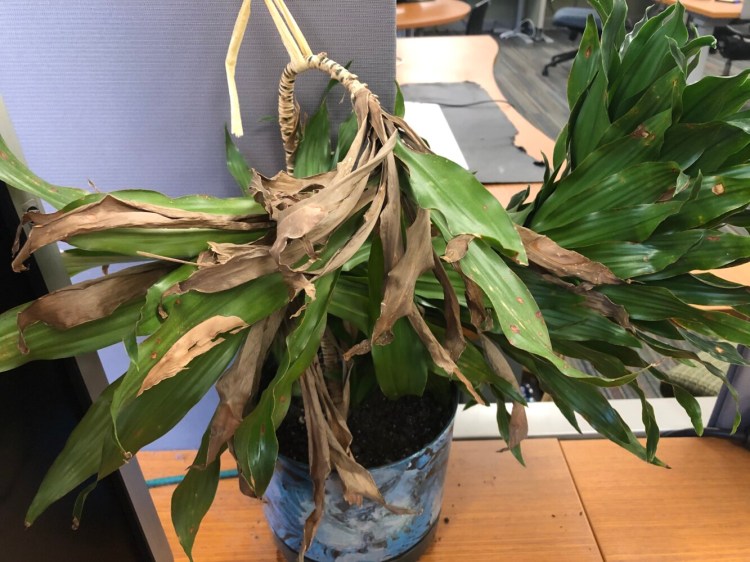Pity the poor office plants. They had survived the low light of winter and were just about to put on their annual spring and summer show last March, when, bam, the employees disappeared. Many still haven’t returned.
Outdoor plants would have been OK, even in a drought year like this. But offices are naturally drier than nature, and indoor plants, it goes without saying, never get the benefit of rain.

This Christmas cactus, left at the Portland Press Herald offices with no one to care for it during the hurry to vacate for the pandemic, was showing the effects of neglect. In early October, when this photo was taken, it was watered heavily and pruned, mostly, of the many dead cladodes. As a succulent, though still droopy in this photo, its chances of survival are good. Photo by Peggy Grodinsky
My editor recently had to stop by the office for the first time since March, and she was dismayed at the state of the plants there. Many had shriveled up and died, and even those that hadn’t, mostly succulents and cacti, were ailing badly. During her office visit she took the time to water every plant in the newsroom – hoping to coax some back to life.
Now that the subject was on my mind, I mentioned office plants to my family during our weekly Zoom session.
Our son Zachary, who works for Harvard Business Publishing in Watertown, Massachusetts, and has been working at home during the pandemic, said his plants are doing fine, including a palm he is especially fond of that he got in the early 1990s while working summers at the now-closed Barrows’ Greenhouses in Gorham. His office also has what he called “corporate plants,” and he said that the company hired to tend those plants has expanded its domain during the pandemic to include plants that employees left behind. Someone even sent Zach a picture of his palm tree.
Locally, Outside In, based in Cape Elizabeth, is an indoor plant service and design company that works in Maine and nationally. Owner Erica Vargo said while she has had to make adjustments for safety, her business is going strong. She hasn’t lost any clients, both because they may have a personal and emotional relationship with their office plants, and beyond that, they want to protect the investment they have in these corporate plants, she said. In fact, she’s actually added a few clients who can’t maintain their office plants themselves for the time being.
For clients that still have people in the office, she adjusted her staff’s visitation schedules so plants could be tended weekends or evenings, when offices are quieter. “We lost a lot of personal touch with the people,” Vargo said. “Places that were always bustling now look like a ghost town.”
It’s been clear to her that some employees, even though working from home, have continued their relationship with their office plants. As some plants – she mentioned a gorgeous purple gloxinia and some orchids – were about to come into bloom, they disappeared from the empty office, only to return when they were no longer in bloom.
But not all workers are employed by companies that hire professionals to care for office plants. Can plants in those offices be revived?
Bill Kinney, plant guru at Allen, Sterling & Lothrop in Falmouth, said that if a plant shows any signs of life it’s worth attempting a rescue. The first thing people should do – especially if they are bringing an office plant to a home that already has house plants – is to treat it with insecticidal soap. You know that expression about leaving office problems at the office? That applies to plants, too – you don’t want them to bring any residual office pests into your home.
He agreed with my editor that the plants most likely to survive are those that thrive on neglect, like cacti and succulents.
Some pruning will be required, Kinney said, and not just the parts of the plant that have died. Many plants, especially succulents, will be getting leggy because they are reaching toward the light, especially if the office lights are mostly turned off.
Then just water them and see if they come back to life.
If they don’t, you can always buy new ones. He recommends old-style plants like those your grandmother grew. He suggested wandering Jew (Tradescantia), Anthuriums because they do well in low light, and spider plants. “They were popular then because they are so easy to grow,” Kinney said.
And we don’t need any more pressure on us right now.
Tom Atwell is a freelance writer gardening in Cape Elizabeth. He can be contacted at: tomatwell@me.com.
Send questions/comments to the editors.



Success. Please wait for the page to reload. If the page does not reload within 5 seconds, please refresh the page.
Enter your email and password to access comments.
Hi, to comment on stories you must . This profile is in addition to your subscription and website login.
Already have a commenting profile? .
Invalid username/password.
Please check your email to confirm and complete your registration.
Only subscribers are eligible to post comments. Please subscribe or login first for digital access. Here’s why.
Use the form below to reset your password. When you've submitted your account email, we will send an email with a reset code.